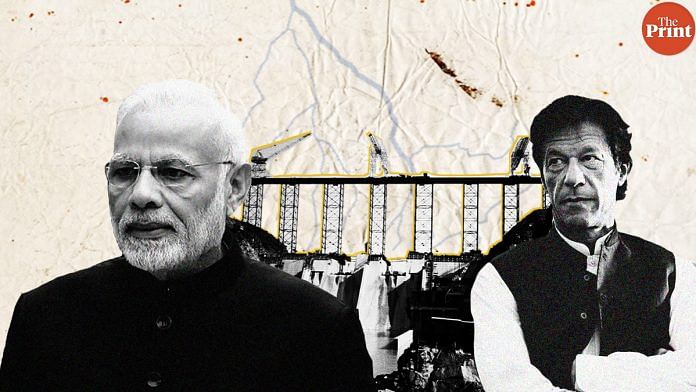In the wake of the Pulwama terror attack, union minister for water resources Nitin Gadkari tweeted Thursday that India will “stop its share of water which used to flow to Pakistan” and instead “divert and supply” it to people of Jammu and Kashmir.
A senior ministry official, however, said the minister was “reiterating what he always said”. Under the bilateral Indus Waters Treaty, India has the right to the three eastern rivers.
ThePrint asks: Can India hurt Pakistan with new Indus dams or Modi govt hyping old project after Pulwama?
India’s move is commendable because the diverted water will benefit our states
 Sujit Datta
Sujit Datta
Senior Fellow & Cluster Leader, VIF
It appears that this is a move that India initiated before the Pulwama attack occurred. The basis of the move is entirely legal and was long overdue. It involves diverting water flow only from the three eastern rivers – Ravi, Beas, and Sutlej – on whose waters India has a legitimate claim under the Indus Water Treaty, but has not been utilising.
Large proportions of water that belonged to India were flowing into Pakistan, even though they had no claims over it. This portion instead can be utilised in Punjab and Jammu & Kashmir, which suffer from water scarcity.
Thus, the move is commendable because the water will be utilised in regions that could greatly benefit from it. It will of course take some time before this happens, because the actual dam and storage facility is still under construction. In material terms, Pakistan will certainly suffer because this water was flowing to their country gratis from India. Since India has full right over the waters, there cannot be any diplomatic hurdle.
It could also send out a message to Pakistan, as the pressure will be adequate to make them aware of the co-dependency of the two nations. Pakistan should realise that they cannot afford to have hostile policy measures against India.
Only if India addresses grievances of Kashmiris will Pak-sponsored militancy be rooted out
 Taha Siddiqui
Taha Siddiqui
Award-winning Pakistani journalist living in exile in France
We have seen India threatening Pakistan before with stopping or diverting water supply. In the past, this has been more or less a rhetorical threat that India has not acted upon primarily because if it does stop the water, it will end up flooding its own region. India currently does not have the capacity to store this extra water.
That said, it seems India’s threat this time is being taken seriously in Pakistan, and they want to mitigate the situation after the Pulwama terror attack, which was linked to Pakistan-origin Jaish-e-Mohammed. There are reports emerging in local Pakistani media that Pakistan is going to take action against Kashmir-focused militants, but I do not believe that Pakistani military is in the mood to dismantle such jihadi infrastructure altogether.
It has an incentive to show it is doing something given regional and global pressure, but no incentive to actually end the policy of using proxies in regional conflict. All this has happened before as well. A terror act, followed by Pakistan’s denial and then some cosmetic action, and then everything going back to the same situation.
Threatening water supply cuts will only create further animosity between the two countries that jihadis will then use to further radicalise common public in Pakistan and Kashmir. If Modi or rather the Indian government wants a long-term solution, it should address the grievances of the Kashmiri people. If India manages to do that, Pakistan-sponsored militancy will not be able to survive, and there can be peace.
Gadkari’s statement on Indus water is an old story with a new headline
 Sandeep Bhardwaj
Sandeep Bhardwaj
Research associate specialising in South Asian geopolitics, CPR
Nitin Gadkari’s statement on stopping the flow of Indus water to Pakistan is re-packaging of an existing story under a fantastic headline. To present it as India’s ‘response’ to the Pulwama attacks is disingenuous — the projects in question are neither new, nor will they affect Pakistan significantly. This kind of posturing only serves to erode India’s ability to coerce Pakistan in the future.
First, it is implicit in the statement that India will continue to abide by its 1960 water-sharing agreement with Pakistan. Second, the three projects mentioned are already underway, as pointed out by Gadkari’s own ministry. Third, and most importantly, actually stopping all of the water from flowing into Pakistan would require a highly difficult engineering feat costing colossal amounts and a very long time. Pakistan has said that it is neither concerned nor objects to India’s projects on the eastern rivers of the Indus.
This only goes to show that the government’s national security policy is no longer directed toward managing security threats but towards managing political perceptions of the Indian public. In any case, what is needed right now is not public posturing or even tit-for-tat retaliation, but a systemic attempt to resolve the unrest in Kashmir and strengthen India’s long-term deterrence against Pakistan.
Water war is risky as Pakistan’s all-weather friend China could take it to the next level
 Manvendra Singh
Manvendra Singh
Editor, Defence and Security Alert magazine and member, INC
Water wars are very expensive, very prolonged, and they haven’t yet produced a clear winner. The Modi government’s yet another announcement to divert waters currently going to Pakistan has little to do with Pulwama and more with the upcoming Lok Sabha elections, hence its timing.
Several studies to stop the flow of water to Pakistan have been conducted, and despite India being authorised, it hasn’t managed to do so simply because of the expenses and the legal bureaucratic procedures involved.
There is nothing to suggest these can be fast-tracked. Rajasthan, the most water deficient state in India, hasn’t managed to stop the annual flooding/flow of Ghaggar river into Pakistan, whereas these are enormous perennial rivers.
Water is a global commons, and must be treated as such. Chambal river and southwards can be safely called Indian in toto, but anything Himalayan is risky.
This government, and Prime Minister Narendra Modi in particular, has been tip-toeing around China. But one should remember that geography cannot be changed and all these rivers emanate from Tibet, now under the Chinese control.
Since the Chinese consider Pakistan as an all-weather friend, they could well take the water wars to the next level. And they have demonstrated that in the recent past.
Curtailing water flow will worsen India-Pakistan relationship, may invite retaliation
 Zahid Saeed
Zahid Saeed
Former Pakistani diplomat
The Indus Water Treaty is very comprehensive in nature. This idea that all the Eastern rivers belong to India and the Western rivers to Pakistan is not entirely correct. The treaty clearly says that some water can be used by the other side for domestic purposes and limited agricultural use. It will certainly be a diplomatic challenge to stop the water from flowing to Pakistan and will lead to damages.
India should be a reliable neighbour and stay true to its agreements. Breaching agreements in this fashion will not lead to any good in the long run. We need to actively work towards normalisation, and not conflict.
A local group in Pulwama reacted violently and that is sad. But this is what oppressing an entire state does. Pakistan has nothing to do with it. However undesirable the relationship was, it doesn’t mean that it should determine the long-term relationship between India and Pakistan.
Curtailing the water flow will now further worsen the relationship between the two countries and may even invite retaliations. Surely, that isn’t desirable. Cooperation between the two countries is the only thing that will lead to better conditions in the region.
By Fatima Khan, journalist at ThePrint.




As Shri Manvendra Singh explains, if India has been unable to fully utilise its entitlement under the IWT, that is because of hydrology and economics, not any great love for Pakistan. In fact, had it been possible / profitable for us to do so, we would have tapped into Pakistan’s share as well, never mind a piece of parchment. 2. There are increasing disputes between Egypt and countries like Sudan and Ethiopia over the sharing of the waters of the Nile. Growing populations in countries upstream mean that they are no longer satisfied with what was allocated to them in the past. Not just foes like India and China, even friends will get tetchy when it comes to sharing rivers in a water stressed world. 3. This current debate is part of an electorally driven agenda.